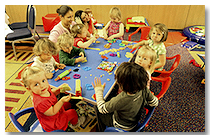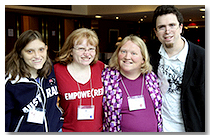Chromosome 18 disorders: a European parent group to lean on
 The Chromosome 18 Registry and Research Society (Europe) is a charity that has been set up to bring together European families affected by any Chromosome 18 abnormality to share information and experiences. It held the first European-wide parent support conference on Chromosome 18 disorders in Glasgow, Scotland in July 2010.
The Chromosome 18 Registry and Research Society (Europe) is a charity that has been set up to bring together European families affected by any Chromosome 18 abnormality to share information and experiences. It held the first European-wide parent support conference on Chromosome 18 disorders in Glasgow, Scotland in July 2010.
There are five major disorders involving chromosome 18 (18q-, 18p-, ring 18, tetrasomy 18p and inversions of chromosome 18). Each of these conditions has a wide variety of characteristics and to complicate things, each of the conditions can vary in severity.
“My wife Judy and I, as grandparents of a grandchild with a Chromosome 18 q- disorder, attended the annual conference of the Chromosome 18 Registry and Research Society in 2007 held that year in Plymouth, Massachusetts. In Plymouth we met Bonnie McKerracher and her daughter Kathryn (also 18q-) who, like us, live in Scotland. Bonnie and Kathryn had attended many conferences. It struck all of us that the comfort and help given to us by the conference should be extended to Scotland, and Bonnie and I went home resolved to try and do this,” says Chris Wilkinson, Convenor of the Chromosome 18 Registry and Research Society (Europe).
 Bonnie Mc Kerracher’s daughter Kathryn was born with 18q- 30 years ago. She was not properly diagnosed until almost 7 years old. “She was born with a clubfoot and a huge umbilical hernia; she began missing milestones and was delayed in both speech and development. She was hearing impaired and had low muscle tone. More physical problems were discovered as she grew older” describes Bonnie, the society’s Secretary.
Bonnie Mc Kerracher’s daughter Kathryn was born with 18q- 30 years ago. She was not properly diagnosed until almost 7 years old. “She was born with a clubfoot and a huge umbilical hernia; she began missing milestones and was delayed in both speech and development. She was hearing impaired and had low muscle tone. More physical problems were discovered as she grew older” describes Bonnie, the society’s Secretary.
The Chromosome 18 Registry and Research Society (Europe) was set up in November 2008. “Bonnie and our son are members of Unique, the British charity for all chromosome disorders, and Unique allowed us to hold a meeting at the end of their annual conference where our constitution was formally adopted and the society set up,” remembers Chris. Twenty members were present at the first meeting and the society counts 83 members to date.
Many parents are given a very pessimistic prognosis when their child is first diagnosed: the doctors who make the diagnosis have rarely seen other patients who are affected by the same disorder, and are unsure what outcomes they should expect. This leaves families confused and scared. Often the healthcare professionals are unaware of all the challenges, physical and developmental, that our children can face. And so parents chase around from clinic to clinic, getting eyes, ears, muscle tone, and bones checked, and those are the lucky ones whose children don’t have feeding and heart issues. Later, they may be slow to speak, and another round of specialists and therapists begins,” says Bonnie.
The Chromosome 18 Registry and Research Society (Europe) aims to make the difficult path from diagnosis to good care and living with the disease easier. The aims of the society are raising awareness amongst healthcare and education professionals about the challenges children and families face every day; and helping parents on a daily basis, making sure they are correctly supported, allowing parents to contact each other (through a ‘Parents Networks’ registry) and last but not least, informing parents that with accurate and consistent intervention, their child can grow up to experience a full life with all the possibilities that other children enjoy.
More details about the conference: www.chromosome18eur.org
Author: Nathacha Appanah
Photo credits: © Chromosome 18 Registry and Research Society
This article was first published in the December 2010 issue of the EURORDIS newsletter
